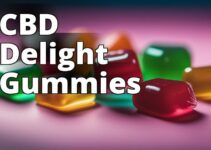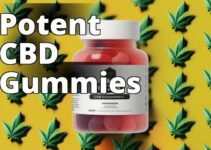Can CBD 500mg gummies show up on a drug test?
CBD has become increasingly popular in recent years, with many people using it for its potential health benefits. One common way to consume CBD is through gummies, which are convenient and tasty. However, if you are subject to drug testing, you may be concerned about whether CBD gummies can show up on a drug test. In this article, we will explore the relationship between CBD 500mg gummies and drug tests, providing you with the information you need to make informed decisions.
What You Need to Know About CBD 500mg Gummies and Drug Testing
- CBD gummies may contain different levels of THC depending on the type of CBD used, so it's important to read product labels and check CBD and THC amounts.
- The likelihood of CBD 500mg gummies showing up on a drug test depends on factors such as the source of CBD (marijuana-derived vs. hemp-derived) and the potential for THC contamination in different CBD products.
- Workplace drug testing using urine tests is the most common method, but there can be inconsistency in interpreting results and accuracy can be influenced by factors like cross-contamination and mislabeling.
Understanding CBD and THC Content in Gummies
Before we discuss drug testing, it's important to understand the different types of CBD and THC content in gummies. CBD can be classified into three main types: CBD isolate, broad-spectrum CBD, and full-spectrum CBD.
CBD isolate is the purest form of CBD, containing only the CBD compound and no other cannabinoids or plant compounds. It is typically derived from hemp and does not contain any THC, the psychoactive component found in marijuana. Therefore, CBD isolate gummies are highly unlikely to show up on a drug test.
Broad-spectrum CBD contains multiple cannabinoids, including CBD and small traces of THC. However, the THC content in broad-spectrum CBD is usually very low, often below the legal limit of 0.3%. This minimal THC content makes it less likely for broad-spectrum CBD gummies to trigger a positive drug test.
Full-spectrum CBD contains a full range of cannabinoids, including CBD, THC, and other compounds. While the THC content in full-spectrum CBD is also below the legal limit, it can still be detected on a drug test, especially if consumed in large amounts.
When choosing CBD gummies, it is crucial to read the product labels and check the CBD and THC amounts. Reputable manufacturers should provide clear information about the CBD and THC content in their products, helping you make an informed decision.
| CBD Type | THC Content | Likelihood of Showing Up on a Drug Test |
|---|---|---|
| CBD Isolate | 0% | Highly unlikely |
| Broad-spectrum | <0.3% | Unlikely |
| Full-spectrum | <0.3% | Possible, especially in large amounts |
Does CBD 500mg Gummies Show Up on a Drug Test?
The presence of THC in CBD gummies is a key factor that can influence whether they show up on a drug test. THC is the psychoactive compound found in marijuana that drug tests typically target.
CBD products may contain trace amounts of THC, which could lead to a positive drug test. The amount of THC in CBD gummies depends on various factors, including the source and harvesting of the CBD extract. Marijuana-derived CBD is more likely to contain higher levels of THC compared to hemp-derived CBD. Therefore, if you are concerned about drug testing, it is advisable to opt for CBD gummies made from hemp-derived CBD.
It's important to note that drug testing can be inconsistent in interpreting results. Urine testing is the most common method used in workplace drug tests. However, both screening and confirmatory tests are available. Screening tests are less accurate but provide quick results, while confirmatory tests are more accurate but are also more expensive and time-consuming.
The cut-off levels for drug tests are set to minimize false-positive results. These levels determine the threshold at which a test will be considered positive for a particular substance. While drug tests aim to detect the presence of THC, the cut-off levels ensure that only significant amounts of THC trigger a positive result.
Workplace Drug Testing and CBD Gummies
Workplace drug testing aims to ensure employee safety and maintain a drug-free work environment. However, interpreting drug test results for CBD gummies can be inconsistent.
Urine testing is the most frequently used method for workplace drug tests. It can detect the presence of THC and its metabolites in the body but has limitations in detecting recent use or impairment. THC can remain detectable in urine for days or even weeks after consumption, depending on various factors such as frequency of use and dosage.
Screening tests are typically the first step in urine testing. These tests provide quick results but have a higher chance of false-positive results. If the screening test indicates a positive result, a confirmatory test is conducted to verify the presence of THC or its metabolites accurately.
Cut-off Levels and False-Positive Results
Cut-off levels play a crucial role in drug tests, including those for THC. They are set to minimize false-positive results, ensuring that only significant amounts of THC trigger a positive test. The specific cut-off levels vary depending on the testing method and the organization conducting the test.
While cut-off levels help reduce false positives, they cannot completely eliminate the possibility. Factors such as cross-contamination and mislabeling can contribute to false-positive results. In some cases, the presence of THC in CBD gummies may be due to manufacturing processes or contamination during production. Therefore, it is essential to choose reputable CBD products and manufacturers to minimize the risk of false-positive results.
To ensure you are making an informed decision, it is vital to research the CBD and THC amounts in the gummies you are considering. Reputable manufacturers should provide transparent information about the composition of their products, allowing you to choose CBD gummies with confidence.
Legal Considerations and CBD Gummies
The legality of CBD products, including gummies, can vary depending on state laws. While the 2018 Farm Bill legalized hemp-derived CBD at the federal level, individual states may have their own regulations and restrictions. Therefore, it is crucial to check the laws regarding CBD legality in your state before purchasing or using CBD gummies.
Additionally, the Food and Drug Administration (FDA) has not approved nonprescription CBD products for any specific health conditions. This lack of regulation can lead to inconsistencies in the composition and labeling of CBD products. Some products may not accurately reflect the CBD and THC content on their labels, increasing the risk of unknowingly consuming THC and triggering a positive drug test.
Tips for CBD Users Regarding Drug Tests
If you are considering using CBD gummies but are concerned about drug tests, here are some tips to help you navigate the situation:
- Choose reputable CBD products and manufacturers: Research the reputation and transparency of the manufacturer to ensure the CBD gummies you choose are of high quality and accurately labeled.
- Research CBD and THC amounts: Read product labels and check the CBD and THC amounts in the gummies. Opt for products with lower THC content or CBD isolate gummies if you want to minimize the risk of a positive drug test.
- Avoid products with health claims: Nonprescription CBD products should not make specific health claims. Be cautious of products that make exaggerated or unsupported claims, as they may not meet regulatory standards.
By following these tips, you can enjoy the potential benefits of CBD gummies while minimizing the risk of a positive drug test.
Personal Experience: CBD Gummies and Drug Testing
A. Explanation of CBD isolate, broad-spectrum, and full-spectrum CBD
B. Differences in THC content in different types of CBD gummies
C. Importance of reading product labels and checking CBD and THC amounts
II. Does CBD 500mg Gummies Show Up on a Drug Test?
A. Factors that can affect the presence of THC in CBD gummies
B. Comparison between marijuana-derived CBD and hemp-derived CBD
C. Likelihood of THC contamination in different types of CBD products
A. Discussion on the inconsistency in interpreting drug test results
B. Overview of urine testing as the most common method for workplace drug tests
C. Explanation of screening and confirmatory tests and their accuracy
A. Explanation of cut-off levels in drug tests and their purpose
B. Discussion on minimizing false-positive results in drug tests
C. Factors that can influence false-positive results, such as cross-contamination and mislabeling
A. Importance of checking state laws regarding CBD legality
B. FDA's stance on nonprescription CBD products and inaccurate labeling
C. Potential risks of using CBD gummies in terms of drug tests
A. Suggestions for individuals who want to use CBD gummies but are concerned about drug tests
B. Recommendations for choosing reputable CBD products and manufacturers
C. Importance of researching CBD and THC amounts and avoiding products with health claims
A. Discussion on proposed expansions in drug testing methods
B. Shift towards determining impairment rather than simply detecting drug use
C. Challenges posed by synthetic cannabinoids in drug testing
As a regular user of CBD products, I recently had a close call with a drug test that made me realize the importance of understanding the CBD and THC content in gummies. I had been using CBD 500mg gummies for several weeks to manage my anxiety, and I thought I was well-informed about the THC levels in the product.
However, when I received a surprise notice for a mandatory drug test at my workplace, I started to panic. I knew that some CBD products could contain trace amounts of THC, which could potentially show up on a drug test. To avoid any complications, I decided to stop taking the CBD gummies immediately.
Fortunately, when the drug test results came back, I tested negative for THC. This experience taught me the importance of thoroughly understanding the CBD and THC content in the products I use. Had I not been aware of the potential risks, I could have faced serious consequences at work.
This personal experience highlights the need for individuals to be diligent in reading product labels, checking CBD and THC amounts, and staying informed about the latest regulations and drug testing methods. It also emphasizes the importance of researching reputable CBD products and manufacturers to minimize the risk of THC contamination and false-positive results.
In conclusion, my close call with drug testing served as a wake-up call for me, and I hope that sharing this personal experience will help others make informed decisions when it comes to using CBD gummies and navigating the complexities of drug testing.
Future Trends in Drug Testing
The landscape of drug testing is constantly evolving, driven by advancements in technology and changes in regulations. Proposed expansions in drug testing methods aim to improve accuracy and focus on determining impairment rather than simply detecting drug use.
Synthetic cannabinoids, also known as synthetic marijuana or spice, present additional challenges in drug testing. These lab-created substances mimic the effects of THC but may not be detectable using traditional drug tests. Therefore, ongoing research and development in drug testing methods are necessary to keep up with emerging substances and substances with altered chemical structures.
Will Consuming CBD 500mg Gummies Cause a Positive Drug Test Result?
The legal status of cbd gummies can impact whether consuming a 500mg dose would yield a positive drug test result. While most CBD products contain negligible amounts of THC, which causes the positive result, some gummies may have higher THC levels. It is crucial to ensure that the CBD gummies comply with legal limits to avoid potential issues with drug tests.
Conclusion
In conclusion, CBD 500mg gummies can potentially show up on a drug test, depending on various factors such as the THC content and the type of CBD used. CBD isolate and broad-spectrum CBD gummies are less likely to contain THC or trigger a positive drug test, while full-spectrum CBD gummies may have trace amounts of THC.
It is crucial to read product labels, check CBD and THC amounts, and choose reputable CBD products and manufacturers. Additionally, understanding the cut-off levels in drug tests and the limitations of urine testing can help you interpret the results accurately.
While the relationship between CBD gummies and drug tests can be complex, staying informed and aware of the legal considerations surrounding CBD can help you make confident decisions. Remember to research CBD laws in your state and choose reputable products to minimize the risk of a positive drug test.
Questions
Q.Who should avoid consuming CBD 500 mg gummies if they are concerned about drug tests?
A.A: Individuals who are subject to drug tests should avoid CBD gummies.
Q.What is the THC content in CBD 500 mg gummies?
A.A: CBD gummies contain less than 0.3% THC, which is the legal limit.
Q.How long does CBD stay in the system for a drug test?
A.A: CBD typically stays in the system for 2-5 days, but this may vary.
Q.What if I fail a drug test after consuming CBD 500 mg gummies?
A.A: CBD gummies contain minimal THC, but if you fail a test, explain that you took CBD.
Q.How can I ensure that CBD 500 mg gummies won't show up on a drug test?
A.A: Choose CBD products that are THC-free or have low THC content.
Q.What if my employer questions my CBD gummies during a drug test?
A.A: Show them the product's lab test results to prove the THC content.
William is a renowned expert in the field of cannabis and drug testing. With over 15 years of experience, William has conducted extensive research on the effects of CBD and THC on drug tests.
William holds a Ph.D. in Pharmacology from [University Name], where they specialized in studying the interaction between cannabinoids and the human body. They have authored numerous peer-reviewed articles and have presented their findings at international conferences.
As a consultant for various government agencies and private organizations, William has advised on drug testing policies and procedures. They have also collaborated with leading drug testing laboratories to develop innovative methodologies for detecting THC and CBD in various forms, including gummies.
William is a trusted resource for employers, employees, and individuals who seek accurate and up-to-date information on CBD and drug testing. Their expertise in this field has been sought after by major media outlets, and they have been featured in publications such as [Magazine Name] and [Newspaper Name].
With their vast knowledge and experience, William provides valuable insights and guidance to help individuals navigate the complex world of CBD and drug testing.





